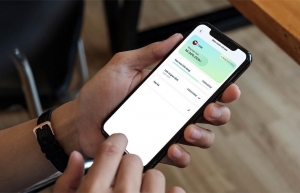BNPL services open up e-commerce options
At a VIR talk show last week on the role of buy now, pay later (BNPL) in shaping the future of retail payments, experts agreed that fast verification and credit-based payment with no interest are the biggest selling points of BNPL, in the context that fintech and online shopping are booming.
 |
Michal Skalicky, chief customer officer of Home Credit Vietnam, said that there are only three steps to register for Home PayLater: online registration with a copy of an ID card, a selfie, and online contract completion.
“Unlike traditional instalment payment schemes that require customers to provide a bewildering array of documentation such as ID cards, household registration documents, bank statements, and others, Home PayLater services offer a simple and fast BNPL registration option that maximises the advantages of digital technology,” Skalicky said. “The application is then automatically processed without having to wait a long time for results.”
According to Nguyen An Son, head of Project Development at the Centre for Informatics and Digital Technology at the Ministry of Industry and Trade’s Department of E-commerce and Digital Economy (iDEA), as BNPL relies on a large credit scoring database from service providers, the larger the database, the more accurate the scoring.
“For the digital economy in general and e-commerce in particular, the emergence of a new form of payment will contribute to making the retail market become more vibrant and developed,” Son assessed.
As attractive as it may sound, consumer awareness is still a challenge since this payment option has only been available in Vietnam in the past year. Nguyen Anh Cuong, co-founder and CEO of Fundiin, assessed that customers often find it hard to believe they can borrow credits with zero interest.
“So even though it sounds counter-intuitive, introducing a no-fee and no-interest product to the market takes quite some time,” Cuong noted.
In terms of legality, bad debts and information security are identified as the biggest obstacles for BNPL. However, a legal framework and information controlling system are being put in place by different governing bodies, as a personal identifier is the most important part of credit-based payment methods.
“I believe in just a short time span, with the explosion of technology and e-commerce, a sandbox for fintech would be put in place, and a few prominent companies will be selected to participate,” Le Van Duong, partner of Indochine Counsel said, adding that the State Bank of Vietnam would need to advance their technology to better control new payment forms and possibly learn from some other countries’ citizen scoring system.
Son of the iDEA added that a range of solutions and infrastructure are being constructed to enhance consumer confidence in e-commerce, including the Vietnam e-contract development axis, or the national e-commerce payment system KeyPay.
“These layers of security will be completed in an open fashion so that businesses can connect and exchange data and provide transaction assurance for consumers. This, we hope, will indirectly help BNPL solve the problem of consumer confidence,” Son noted.
The experts at the talk show assessed that in the near future, some of the industries that would see the biggest growth in BNPL include entertainment and education, as consumers aged 18-26 are the age group with the highest BNPL penetration.
“Besides traditional transactions paid in instalments such as electronics, motorbikes, household products, and education, Home Credit will also open up new BNPL schemes for air tickets, travel, cosmetics, and more,” Skalicky of Home Credit noted.
As for local e-commerce platforms, Tiki Corporation senior director Lu Duy Nguyen shared that the three most important factors when selecting BNPL partners are customer experience, the cost for operation and credit rating, and the partners’ personnel and investment.
“As this is a new and innovative product, we believe the human and capital required for its development is considerable. So we strongly prefer partners with sufficient resources to support the product,” Nguyen said.
| Nguyen Anh Cuong - Co-founder and CEO, Fundiin
Traditionally, investors wanted to invest in firms with significant growth and a large user base, but they are now more interested in startups with a path to quickly attain profitability. For Fundiin, the emphasis is always on producing a quality product without spending too much money on acquiring clients. The firm also concentrates on technical advancements. Therefore, we do not have a problem with sustained development when investor preferences shift, since this has always been the company’s focus. We manage risk based on two criteria: the proactive collection of fresh data and the use of technology to construct strong credit rating models based on client transactions. Our customer selection criterion is based on the connection between BNPL and retail partners, as well as clients, partners, and BNPL, so that all parties profit. The primary product of Fundiin is BNPL. It has the same appearance as a credit card, despite the fact that the global credit card use rate is between 50 and 70 per cent, while Vietnam has a rate of more than 5 per cent. When BNPL expands in Vietnam, there will be greater room since the bulk of the population lacks access to card payments. BNPL provides a completely free solution. However, many consumers and retail partners do not believe in a completely free fintech solution until they use it. Legality is also an impediment. When nations in the area have been legal for 5-6 years, their fintechs are well developed, have mobilised a great deal of cash, and have begun going to Vietnam to grab market share. Fintech in Vietnam, on the other hand, has mobilised all available funds, but it lacks a sandbox for management. We have met several investors in Asia who wish to invest in BNPL, but there is a legal obstacle, which has a negative impact on investment attractiveness. However, there are investment groups that think the regulator will improve the sandbox system if a business delivers substantial value to customers and is approved. Le Van Duong - Partner, Indochine Counsel
The BNPL company plays the role of an IT service provider that operates a platform connecting consumers with merchants and lenders. To merchants and lenders, the company offers its platform and tools, especially machine-learning algorithms, to analyse consumers’ shopping behaviours for credit provision purposes. Via the platform, the application for a loan is submitted for the lender’s consideration. Upon approval, the loan proceeds are disbursed either directly to the merchant responsible for the purchase, or to the appointed bank account of the consumer to finance the relevant purchase. The merchant then proceeds with the purchase, and consumers make the repayment in instalments. From a practical standpoint, compared with other structures, the partnering structure proves to be pragmatic and efficiently harmonises various needs of the involved players, while effectively mitigating compliance risks. The partnering structure enables the fintech platform to leverage the credit of the finance company, which provides the necessary lending licenses and experience to deliver credit to the customers. It also allows all parties to benefit from credit performance and underperformance on the credit. Lu Duy Nguyen - Senior director Tiki Corporation
Online payments have become widespread, and BNPL is also an online payment method. However, depending on their credit ratings, BNPL allows customers to spread out spending over a longer period of time. Credit management oversight for each person will vary based on the individual’s credit use. The number of reports proves that it will increase by 15-30 per cent and become the payment trend of the future. I believe that e-commerce platforms, such as ours, will gain from BNPL because consumers will have a greater desire to shop and spend more money on the floor. With the assistance of BNPL, we can also enhance marketing programmes, promotions, and other features of e-commerce systems like Tiki. Prior to cooperating on the development of a feature on Tiki exchange with BNPL providers, it is important to explain and agree to a number of factors, including the debt collection procedure and the customer service process. We use a set of factors to select partners, including user experience of the product, direct and indirect costs of the product, and coordinating with the system integrator to evaluate creditworthiness in the most accurate manner. The third criterion is evaluating the degree of investment and the team that will invest in product lines for partners. |
 | BNPL products come to aid of consumers The adoption of short-term financing by consumers continues to grow in Vietnam as local and foreign financial companies gear up to meet the soaring demand. |
 | BNPL catalyses cashless payments in e-commerce market As Buy Now, Pay Later (BNPL) becomes more popular in the nation, experts have shared their insights into the prospects of this new payment service as a catalyst to the growing cashless payments in Vietnam’s e-commerce market. |
 | Assessing the potential of buy now, pay later services Home Credit is betting on the prospects of buy now, pay later services in Vietnam. Michal Skalicky, chief customer officer of Home Credit Vietnam, shared with VIR’s Thanh Van his insight into the growth potential in Vietnam’s e-commerce market. |
What the stars mean:
★ Poor ★ ★ Promising ★★★ Good ★★★★ Very good ★★★★★ Exceptional
Related Contents
Latest News
More News
- Private capital funds as cornerstone of IFC plans (February 20, 2026 | 14:38)
- Priorities for building credibility and momentum within Vietnamese IFCs (February 20, 2026 | 14:29)
- How Hong Kong can bridge critical financial centre gaps (February 20, 2026 | 14:22)
- All global experiences useful for Vietnam’s international financial hub (February 20, 2026 | 14:16)
- Raised ties reaffirm strategic trust (February 20, 2026 | 14:06)
- Sustained growth can translate into income gains (February 19, 2026 | 18:55)
- The vision to maintain a stable monetary policy (February 19, 2026 | 08:50)
- Banking sector faces data governance hurdles in AI transition (February 19, 2026 | 08:00)
- AI leading to shift in banking roles (February 18, 2026 | 19:54)
- Digital banking enters season of transformation (February 16, 2026 | 09:00)




 Tag:
Tag:



















 Mobile Version
Mobile Version